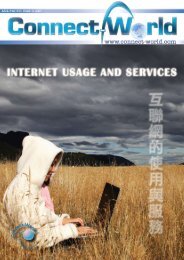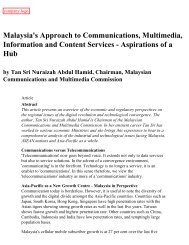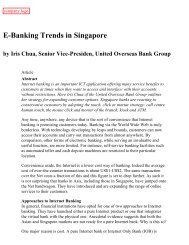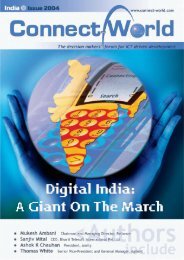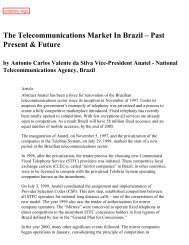Contents - Connect-World
Contents - Connect-World
Contents - Connect-World
You also want an ePaper? Increase the reach of your titles
YUMPU automatically turns print PDFs into web optimized ePapers that Google loves.
Global Development<br />
human resources to<br />
the failures.<br />
This is a dilemma<br />
since many countries<br />
implement ICTs precisely<br />
to improve<br />
their human<br />
resources capacity.<br />
Thus, the central<br />
question becomes<br />
what is the minimum<br />
level of human<br />
resource capacity<br />
required by a country<br />
to enable it to<br />
leapfrog through the<br />
use of ICTs.<br />
During Indonesias<br />
presidency of the<br />
Economic and Social<br />
Council of the United<br />
Nations in 2000, we<br />
promoted and concentrated on the<br />
importance of ICTs for development.<br />
This critical issue was put on the<br />
agenda of the High-Level Segment of<br />
the ECOSOC, where ministers<br />
exchanged views and established a<br />
common stance on the importance of<br />
ICTs in the promotion of development<br />
and the eradication of poverty.<br />
The discussions could be described as<br />
a warm-up session before the meeting<br />
of Heads of State at the General<br />
Assembly, which resulted in the<br />
Millennium Declaration and the<br />
Millennium Development Goals<br />
(MDGs).<br />
The outcome of deliberations and<br />
consultations in the ECOSOC led to<br />
the Ministerial Declaration on<br />
Development and encouraged international<br />
co-operation in the twentyfirst<br />
century in the sphere of information<br />
and communication technology,<br />
especially within the context of the<br />
knowledge-based global economy. In<br />
the Declaration, the consensus is that<br />
ICTs will provide unique opportunities<br />
for economic growth and human<br />
development.<br />
Discussions in the ECOSOC and the<br />
UN Secretary Generals subsequent<br />
establishment of the UN-ICT Task<br />
Force show that the issue is critical.<br />
Unless there is sufficient preparation,<br />
as well as willingness and understanding<br />
on the part of technologically<br />
advanced countries, the ideal<br />
objective of creating an altogether<br />
better world cannot be accomplished.<br />
In this regard, the UN-ICT Task<br />
Force can, through its objectives,<br />
Figure 1: The main focus of encouraging the use of ICTs for development is not the technologies<br />
themselves, but their impact on humanity.<br />
contribute to human development. In<br />
discussing the current dilemma facing<br />
many developing countries, the<br />
main strategy should be to invest in<br />
education and training.<br />
Without question, governments<br />
should spearhead these efforts to<br />
ensure proper implementation, while<br />
engaging the private sectors.<br />
In this context, the participation of<br />
the private sector, particularly the<br />
ICT industries, will indeed remain<br />
crucial.<br />
Despite uneven access to ICTs, also<br />
known as the digital divide, ICT<br />
industries can nevertheless still<br />
bridge the gap for countries wanting<br />
to reap the benefits of modern technology.<br />
During the United Nations<br />
Millennium Summit in 2000, a set of<br />
quantifiable goals was agreed upon<br />
the Millennium Development Goals<br />
as a coherent framework from which<br />
we could focus our efforts.<br />
Under the Global Partnership<br />
Development Plan, the private sector<br />
has a role to play by ensuring that<br />
everyone benefits from advancements<br />
in technology, particularly<br />
ICTs.<br />
“Through education and<br />
increased knowledge,<br />
ICTs will offer tremendous<br />
potential for development.”<br />
The involvement of<br />
private sectors will,<br />
hopefully, allow<br />
greater access to<br />
training and not, on<br />
the contrary, block<br />
access to it.<br />
In effect, training<br />
should be demanddriven<br />
to ensure that<br />
user needs are reflected<br />
and taken into<br />
account and the<br />
objectives they wish<br />
to pursue are fulfilled.<br />
Moreover, it should<br />
be noted that education<br />
and training cannot<br />
be provided for<br />
every individual, or<br />
even country, simultaneously,<br />
on the<br />
same level and at the same pace.<br />
In this regard, it is also important to<br />
realise that human capacity can be<br />
developed by tailoring individual<br />
needs to the particularities of each<br />
case.<br />
With adequate training, individuals<br />
can easily meet their future technological<br />
needs. This is vital, given that<br />
technology continues to evolve, so<br />
people need to not only keep rapidly<br />
up with the latest technological<br />
advancements, but also learn to<br />
utilise them properly.<br />
The commitment and political will of<br />
governments, especially those of<br />
industrialised countries, as well as<br />
that of ICT companies should prevail,<br />
as they carry enormous power in<br />
assuring the dream of a prosperous<br />
and peaceful world. The most important<br />
steps will be the commencement<br />
and acceleration of the transfer of<br />
technology.<br />
At this point, it is worth noting that<br />
ICTs potential contribution to<br />
human development, which includes<br />
elimination of gender disparities, is<br />
currently compromised by the<br />
unevenness in the pace and spread of<br />
these technologies.<br />
Urgent action is needed to ensure<br />
that men and women participate<br />
equally in the ICT sectors.<br />
It is also critical that there should be<br />
programmes designed to encourage<br />
young people to access ICTs and that<br />
employment is created to attract<br />
them to stay, build and expand their<br />
capabilities and help develop their<br />
7











